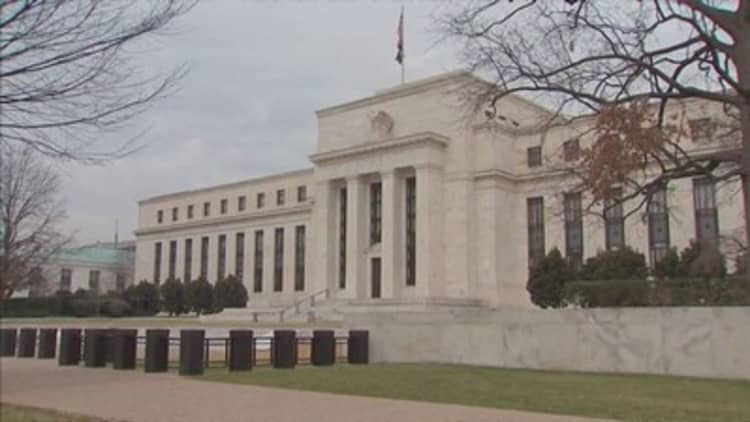Fed Chair Janet Yellen's interest in running a "high-pressure economy" threatens to add to an increasingly divisive climate at the U.S. central bank.
In remarks last week that jarred the market, Yellen ruminated about the benefits of letting inflation run a little hotter than normal while allowing the unemployment rate to drop below the point that historically would trigger Fed tightening action.
To many observers, the comments were a clearly dovish signal that she favors a lower-for-longer approach when it comes to interest rates.
But that kind of attitude could exacerbate tensions among Federal Open Market Committee members, in particular those who have been clamoring for rate hikes.
"Despite the fact that rates were not raised at the September FOMC meeting as we predicted, the truce at Federal Reserve has never been more tenuous and appears to be on the verge of an outright civil war," Doug Roberts, chief investment strategist at Channel Capital Research, said in a note. "The truce between hawks and doves is now being renegotiated."
Right now there are just three hawkish members of the 10 FOMC voters. They are Esther George, who often breaks from the dovish pack, along with Loretta Mester and Eric Rosengren, a recent addition to those pushing for higher rates. The dissenters worry that keeping interest rates too low could hasten a recession if the Fed is forced to act quickly on rates after inflation picks up, according to minutes from the September meeting.
At this point there is a civil war, and the consensus is, the hawks are saying 'We'll allow you to raise rates very slowly, we just want you to start raising rates,'Doug Robertschief investment officer, Channel Capital Research

In addition to the three "no" voters, Vice Chair Stanley Fischer earlier this week spoke on the dangers of low rates.
"The limitation on monetary policy imposed by low trend interest rates could therefore lead to longer and deeper recessions when the economy is hit by negative shocks," Fischer said, according to the text of his remarks. Fischer did say the Fed needs to keep rates low and would be helped by stronger fiscal policy.
Yellen has only seen this level of dissent in her tenure once before, in December 2014. Should it continue or accelerate, the reverberations will be felt through the market.
"At this point there is a civil war, and the consensus is, the hawks are saying 'We'll allow you to raise rates very slowly, we just want you to start raising rates,'" Roberts added in a phone interview. "What the new (consensus) will look like is being renegotiated. ... That, to me, is going to act as an overhang for the market."
Traders currently assign about a 70 percent chance of a rate increase at the December meeting, but then no additional moves through at least September 2017.
Election could play a role
Though the Fed professes independence, Roberts thinks the upcoming presidential election will sway policy.
President Barack Obama has appointed consistently dovish Fed members. He reappointed Yellen's predecessor, Ben Bernanke, then named her in 2013 to chair the central bank.
Democrat Hillary Clinton has spoken comparatively little about the Fed during her campaign, but Republican Donald Trump has been critical of Yellen in particular. That could be a signal he would appoint more hawkish members, though he also has spoken in favor of low interest rates.
Wall Street itself is divided on the rates issue. Some worry that the current low-rate environment has generated capital misallocation and boosted asset values — stocks in particular — while penalizing savers and pensions and holding back economic growth.
In an analysis released Friday, Goldman Sachs economists see only limited benefits to following the "high-pressure economy" strategy, particularly when it comes to the primary malady, low productivity.
"[I]t is hard to have great confidence in the productivity benefits of a high-pressure economy," David Mericle and Avisha Thakkar said in the report. The greatest benefits, they said, would come to low-wage workers who could see pay increases in a tighter labor market.
However, they did note the effects the debate could have on Fed unity.
"Fed officials who believe that there is a clear trade-off between running a high-pressure economy and the expected duration of the expansion are unlikely to be persuaded by these benefits," Mericle and Thakkar wrote. "But for those who do not see as strong a link, the policy might look more like a trade-off between low-probability risks and low-probability benefits.
"We take last week's comments as a sign that this is a live debate on the FOMC, one that could have important implications for the pace of tightening next year and beyond."


